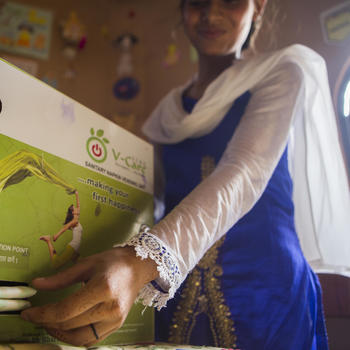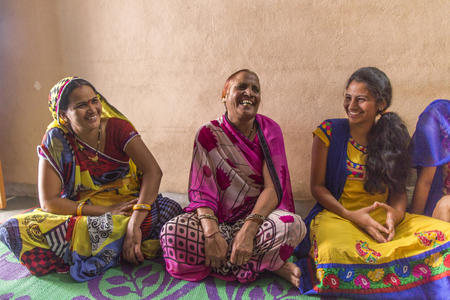Women spend around six to seven years of their lives menstruating. Yet the importance of menstrual hygiene management (MHM) is mostly neglected. Menstrual hygiene is a topic that many women are uncomfortable discussing in public. This is compounded by gender inequality, which excludes women and girls from decision-making processes and prevalence of taboos that seek to restrict women and girls from managing their menstruation safely in a supportive and healthy environment.
A look at some Inspirational stories of change among the women, girls and even men of Madhya Pradesh, who empowered by access to information and materials on MHM, are helping break taboos round menstruation to stride confidently forward in leading healthy and successful lives.
Menstruation is a natural and healthy process that occurs among girls and women of reproductive age. In India, the culture of silence around menstruation compounded by taboos makes it a terrifying experience for most and restricts them from practicing safe menstrual hygiene.
Ganga Bai, 50 Years (Mother); Meenakshi Dongre, 16 Years (Daughter) Not looking directly at the mirror is one of the various taboos associated with menstruation in India. Ganga Bai explained how her family has been following the age old tradition of not allowing her daughter Meenakshi to enter her kitchen or sleep with other family members during her periods.
To create awareness around menstruation among women and girls, the Women and Child Department, Government of Madhya Pradesh has setup Udita corners in 15,000 Anganwadi centres across the state.
Lata Devi, 40 Years Lata Devi, an Anganwadi worker, engages with the women and adolescent girls in the community to talk about menstrual hygiene and clear misconceptions about menstruation.
At the anganwadi centres the girls discuss their menstruation in a light-hearted environment through games and quizzes. In the background, a series of informative posters developed by WaterAid India, which are being used in Udita corners in various Anganwadis in Madhya Pradesh to debunk the common myths that restrict women from performing their regular work like cooking, bathing and eating certain types of food during menstruation.
Easy to use vending machines have been installed at various Anganwadi centres as part of the Udita Project where women and girls can easily access sanitary napkins at minimal cost.
Girls practicing the 5 steps of handwashing: the most effective tool to manage hygiene. Apart from hygiene related information, access to toilets and safe absorbents is critical for managing periods in a healthy way.
During menstruation, adolescent girls skip school for five to six days every month and 23% opt to drop out completely due to the lack of proper toilet facilities and inadequate provisions for managing periods effectively. By improving girls’ access to toilets and providing access to safe menstrual absorbents, we can keep them in school, increase their safety and dignity and make them productive members of society.
Kiran Sankhwai, 37 years (mother in yellow saree) Tanya Sankhwai, 17 years (daughter in black track suit) Monika Sankhwai, 18 years (other daughter in white suit) Charumita, 5 years (youngest daughter) “Till 2 years back, we used to believe that during menstruation, a female is not supposed to touch others. We had to even wait for somebody to fetch us water or give us food. When we were sensitised that menstruation is not impure or unhealthy, we tried touching people without informing that we are menstruating and none of them actually fell ill. We figured that menstruation is not a disease. We just need to ensure good personal hygiene. Every time I enter a kitchen, I wash my hands properly,” said Monika. “It has been really empowering and now we can openly discuss women’s issues with anyone in the community. My daughters can talk to me openly about menstruation related doubts and I feel good about it,” shared Kiran. “Using cloth is a problem because we stay in small houses and there is no place to dry it in direct sunlight. I make bangles and sit in the workshop for 6-7 hours every day. Using a pad is more comfortable,” added Tanya.
16-year-old Ritika Joshi (first from right), shared how she is still made to sleep in a separate room and not allowed to enter kitchen. ‘’We have stopped following some of the taboos, and we will gradually stop believing in others too,” say her grandmother and mother.
Sana Khan, 17 years, Studies in the 9th standard “I don’t have a sister and my mother is very strict so I could never share menstruation related doubts with her. When my periods started, my mother didn’t allow me to enter the kitchen or go to school for 7 days even if there was an exam. I gradually convinced my mother after learning good hygiene practices here at the Anganwadi. Now nobody in the family even finds out that I am on periods and I go to school every day.”
Zakir Hussain, 35 Years “I own this bangle workshop and 7 women work here. If they can come for work during menstruation then why can’t they work in the kitchen? I even have a toilet in the workshop for these females.” “My family does not believe in taboos associated with menstruation. If I ask my wife to not enter kitchen for 3 days then from where will I get food? I have learnt a lot from these females. I even get my wife to speak to them if she faces any menstruation related issue.”
“I used to meet a lot of mothers and tell them about the importance of safe menstrual practices. Most of them found value in it and now they send their daughters to anganwadi centres to know about it,’’ says 37-year-old Urmila Panchal, an ASHA worker. ‘’I advise mothers to send their daughters once they reach 10-11 years so that they are prepared for menstruation and not terrified.’’
26-year-old, Manisha Garud found the greatest support in menstruation from her grandfather and father. ‘’We do not put any restriction on our daughter. Time is changing so why should not we. Let’s leave the taboos behind,’’ says Sanjay Garud, Manisha’s father.
17-year-old Shruti Dubey has an interesting story on how she made people believe there is no value in taboos. ‘’During menstruation everybody used to tell us that do not touch any other girl or they will also start menstruating. I knew there was no reality in this so to prove it I used to touch the girls near me.’’
‘’My daughters are more educated on menstruation than me. I had limited information on menstruation till now. I happily follow what they tell me as I it is for their and my good health,’’ says Jamila Zakir Shah mother of two girls Zainab and Jamila.
Women and girls often resort to using unsafe and unsanitary latrines, and sometime don’t have access to any kind of toilet. The health of women and girls in the family is as dependent on proper sanitation facilities as on a healthy meal. Easy access to information and materials to manage their menstruation enables women and girls to gain confidence and lead healthy lives.
Usha Sahu, 34 Years, Anganwadi Worker since 2007 “Over the last 4 years, I have received various trainings on menstrual hygiene. Udita corner is a great awareness tool. Few key things that I ensure girls understand are hygiene and nutrition required. In this community, I have worked towards reducing a few taboos associated with menstruation. Till 2 years back, even I used to follow some taboos and not worship God while menstruating but now I do. I even tell girls coming to Anganwadis to not follow any such taboos. Initially, a few mothers used to come complaining that I am teaching wrong things to the girls but I convinced them with logic.” “I always wanted to work in an Anganwadi. This is my way of giving back to the society.”
Sangeeta Pravin Salagiya, 45 years (Anganwadi worker) Menstruation in India has traditionally been associated with taboos and adolescent girls find it extremely difficult to even discuss the issue with their parents or elders in the family. In addition to persisting taboos, their capacity to manage periods is affected by a number of other factors, including limited access to affordable and hygienic sanitary materials and disposal options leaving many to manage their periods in ineffective, uncomfortable and unhygienic ways. The Udita Project by the Government of Madhya Pradesh is an essential first step towards breaking the taboos around menstruation.
’We are told about menstruation at Anganwadi centres but it should be made part of school curriculum too. When the chapters around the topic come, teachers just skip it. Once there were only eight girls present in the class and teacher asked us what are periods, one girl answered science period, maths period and the teacher slapped her. It was not her fault we were never oriented on the subject. If we need to learn about these critical aspects from outside then what are we learning at school,’’ says 17-year-old Samiksha Athole. By making available information and materials to manage menstruation safely and hygienically, programmes like the Udita Project can enable women and girls like Samiksha to stride confidently forward and lead healthy and successful lives.
























